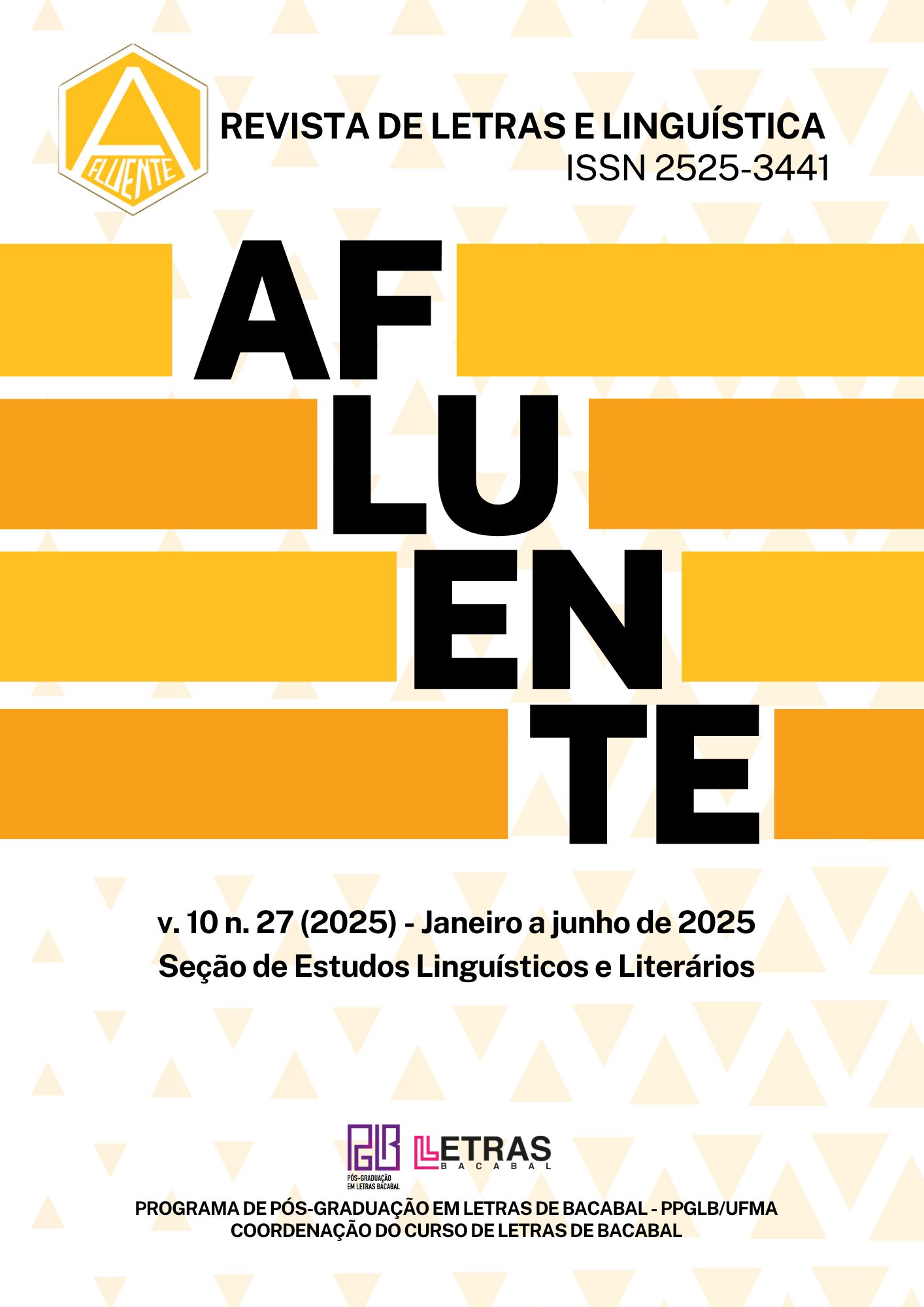O dialogismo e o plurilinguismo nas reportagens e nas cartas enviadas ao "Jornal da Tarde" em Capitães da Areia
DOI:
https://doi.org/10.18764/2525-3441v10n27.2025.03Palavras-chave:
Dialogismo, Plurilinguismo, Vozes, Ideologia, Capitães da AreiaResumo
Este trabalho objetiva analisar o dialogismo e o plurilinguismo nas reportagens e nas cartas enviadas ao “Jornal da Tarde”, presentes na obra Capitães da Areia, de Jorge Amado, evidenciando como os enunciados dialogam entre si e demonstram diferentes construções ideológicas. De modo específico, busca-se identificar o entrecruzamento das vozes sociais nas reportagens e nas cartas presentes na estrutura do romance, verificar como as posições sociais influenciam a construção e as interações discursivas das personagens e explorar as características dialógicas dos enunciados presentes na narrativa. Como aporte teórico, utilizaram-se as contribuições de Bakhtin (2010, 2012) e Fiorin (2006) sobre dialogismo e plurilinguismo no romance e de Candido (2000) sobre literatura e sociedade, dentre outros. A metodologia consistiu em uma revisão bibliográfica, de cunho explicativo-exploratório e abordagem qualitativa. Os resultados obtidos demonstram que, nas reportagens e nas cartas enviadas ao “Jornal da Tarde”, é possível verificar uma multiplicidade de vozes sociais elaboradas a partir de diferentes posições socioideológicas, em que as personagens se apropriam das vozes das outras e dialogam diretamente por meio de discursos responsivos que se relacionam com os contextos extraverbais e com as posições valorativas das personagens envolvidas.
Downloads
Referências
AMADO, Jorge. Capitães da Areia. Rio de Janeiro: José Olympo Editora, 1937.
AMARAL, Maria de Fátima Carvalho do. Bakhtin e o Discurso do Romance:
um caminho para a releitura da narrativa brasileira. Dissertação (Mestrado em Letras), Universidade Católica de Pelotas, Pelotas, p. 112, 2000.
BAKHTIN, M. (V. N. Volochínov). Marxismo e filosofia da linguagem.13. ed. Trad. M. Lahud; Y. F. Vieira. São Paulo: Hucitec, 2012.
BAKHTIN, Mikhail. Estética da criação verbal. São Paulo: Martins Fontes, 2010.
BAKHTIN, Mikhail. Questões de literatura e de estética: a teoria do romance. Tradução do russo Aurora Fornoni Bernardini; José Pereira Junior [et al]. São Paulo: Hucitec, 2010.
CANDIDO, Antonio. A literatura e a vida social. In.: CANDIDO, Antonio. Literatura e Sociedade. São Paulo: Publifolha, 2000.
FIORIN, José Luiz. Introdução ao pensamento de Bakhtin. Editora Ática, São Paulo: 2006.
MATA, Carlos Magno da. O plurilinguismo Bakitiniano em Memórias Póstumas de Brás Cubas. Revista Porto das Letras, Vol. 06, Nº especial. 2020.
OLIVEIRA, Lívia Maria R. S.; FRONZA, Cristiane V. da S.; COSTA, Thaisa Lúcia L. da. Interações sociais e interdiscursividade no romance contemporâneo de Clarice Lispector: uma análise à luz do Dialogismo Bakhtiniano. Revista Linguística, literatura e educação: teorias, práticas e ensino, João Pessoa: Ideia, 2020, p. 84-95.
SANTOS, Andre Cordeiro dos. Linguagem e construção de sentido: o dialogismo como característica base da interação verbal. Odisseia, Natal, RN, n. 15, p. 18-30, jul.-dez. 2015.
SCORSOLINI-COMIN, Fabio. Diálogo e dialogismo em Mikhail Bakhtin e Paulo Freire: contribuições para a educação a distância. Educação em Revista, Belo Horizonte, v.30, n.03, p.245-265, julho-setembro 2014.
VOLOCHINOV, V. Palavra na vida e palavra na arte: introdução ao problema da poética sociológica. In: VOLOCHINOV, V.. A construção da enunciação e outros ensaios. Tradução de João Wanderley Geraldi. São Carlos: Pedro & João editores, 2013.
Downloads
Publicado
Como Citar
Edição
Seção
Licença
Copyright (c) 2025 Afluente: Revista de Letras e Linguística

Este trabalho está licenciado sob uma licença Creative Commons Attribution 4.0 International License.
Direitos autorais Afluente: Revista Eletrônica de Letras e Linguística
Este trabalho está licenciado com uma Licença Creative Commons - Atribuição 4.0 Internacional.














